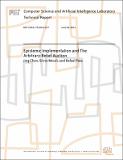| dc.description.abstract | In settings of incomplete information we put forward an epistemic framework for designing mechanisms that successfully leverage the players' arbitrary higher-order beliefs, even when such beliefs are totally wrong, and even when the players are rational in a very weak sense. Following Aumann (1995), we consider a player i rational if he uses a pure strategy s_i such that no alternative pure strategy s_i' performs better than s_i in every world i considers possible, and consider him order-k rational if he is rational and believes that all other players are order-(k-1) rational. We then introduce an iterative deletion procedure of dominated strategies and use it to precisely characterize the strategies consistent with the players being order-k rational. We exemplify the power of our framework in single-good auctions by introducing and achieving a new class of revenue benchmarks, defined over the players' arbitrary beliefs, that can be much higher than classical ones, and are unattainable by traditional mechanisms. Namely, we exhibit a mechanism that, for every k greater than or equal to 0 and epsilon>0 and whenever the players are order-(k+1) rational, guarantees revenue greater than or equal to G^k-epsilon, where G^k is the second highest belief about belief about ... (k times) about the highest valuation of some player, even when such a player's identity is not precisely known. Importantly, our mechanism is possibilistic interim individually rational. Essentially this means that, based on his beliefs, a player's utility is non-negative not in expectation, but in each world he believes possible. We finally show that our benchmark G^k is so demanding that it separates the revenue achievable with order-k rational players from that achievable with order-(k+1) rational ones. That is, no possibilistic interim individually rational mechanism can guarantee revenue greater than or equal to G^k-c, for any constant c>0, when the players are only order-k rational. | en_US |
